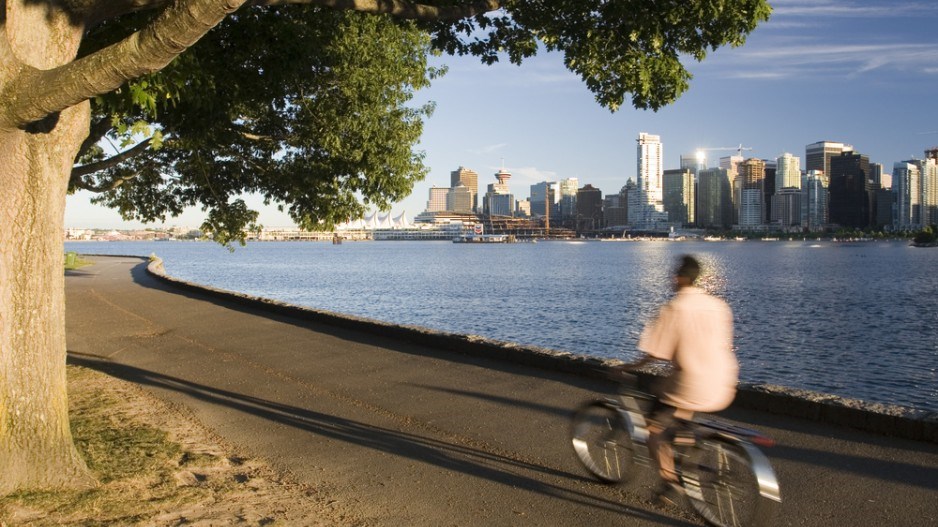Every year when Bike to Work Week comes around, people like me who have biked (and driven and taken transit) to work for decades think now might be the tipping point, when enough barriers have been removed that everyone who has thought about cycling to work will finally do it.
This June, the city of Vancouver is poised for the arrival of bike sharing to our so-called Green City, smelly shared helmets notwithstanding. So now you won’t need to own a bike to ride one. That will help commuters, shoppers and tourists alike.
Cycling overall – commuter and recreational – jumped by more than 30% in the city of Vancouver last year, from 99,000 in 2014 to 131,000. By some measures, we now have a higher percentage of bike trips than Portland.
The Downtown Vancouver Business Improvement Association has moved into a leadership position in promoting bike lanes, now that it’s vividly clear that bike lanes increase retail sales and property values.
The anticipated blowback to the pending closure of yet another lane on the Burrard Bridge to better accommodate cyclists and pedestrians didn’t materialize. Instead, the radio talk show phone lines lit up with angry calls about the over-the-top suicide prevention bars going in.
Overseas, to cite just one example of cycling ramping up, London just opened a 19--kilometre bike “superhighway” linking east and west London, part of its $223 million cycling budget for 2016-17.
But the biggest flashing light for me was the discovery of the “executive bike storage” in Oxford Properties’ Guinness Tower: swank, wood-panelled bike lockers, no doubt with classical music piped in. The good people at Hub Cycling, the non-profit that organizes Bike to Work Week (May 30 to June 5), quickly let me know that bike storage, showers, lockers and e-bike plug-ins are now the new normal. To be at the front of the pack, you have to match the new Vancouver General Hospital Cycling Centre, an indoor bike-parking emporium with all the above plus towel service, a lounge and a bike repair room. Or Holborn’s promised amenities for commercial and residential tenants at its Little Mountain development: all of the above plus a work bench, air compressor, bike-washing station, storage for bike trailers and kids’ tricycles, and a social area.
Left Coast Naturals, a Burnaby-based organic food distribution company with a fairly normal low number of regularly cycling employees (about 5%), goes well beyond the baby step of ending reserved car parking and replacing it with cash payments for any transportation mode. Left Coast pays a $120 monthly bonus to employees who ride their bikes to work at least half the time.
The payoff? According to Statistics Canada, the B.C. sick-days-off average is 7.6. At Left Coast, it’s three days, and zero for bikers. Which makes sense: any form of active transportation – cycling, walking or transit – is likely to deliver what physician and University of Toronto public health Prof. Mike Evans says is the single most beneficial preventive medicine for the biggest range of chronic physical and mental illnesses: 30 minutes of daily exercise.
A University of British Columbia study of the Vancouver Police Department found that the three most requested ways to get biking-to-work rates over 3% were “having secure and convenient parking facilities, a guaranteed ride home and a vehicle to use during the day.”
Sherese Johnson, who links Hub Cycling with businesses, says culture and education are also key: “Workplace cycling lunch ’n’ learns are a great way to introduce cycling to people of all levels and abilities. Small physical things can help too: providing a bike pump and good signage indicating where bike parking exists can make a big difference.”
Cycling to work isn’t possible for everyone. Nor is car ownership or walking or taking transit. It’s all about choice. If cycling to work might work for you or your employees, try it out this week, and see if it really is as easy, convenient, fun, affordable and invigorating as some of us find it to be.
Peter Ladner ([email protected]) is a co-founder of Business in Vancouver. He is a former Vancouver city councillor and former fellow at the SFU Centre for Dialogue. He is the author of The Urban Food Revolution.




